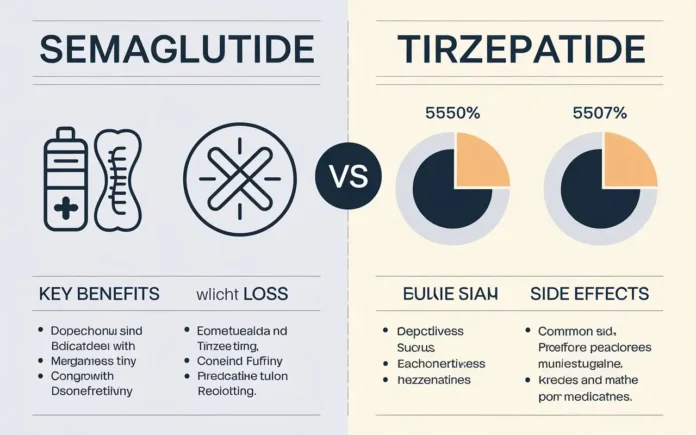1. Introduction
Semaglutide vs Tirzepatide weight loss has become a pivotal topic in the realm of obesity management and metabolic health. With the rising prevalence of obesity and related health conditions, both semaglutide and tirzepatide have emerged as promising pharmacological interventions. This comprehensive guide delves into the nuances of these two medications, comparing their effectiveness, safety profiles, costs, and overall impact on weight loss.
2. Mechanisms of Action
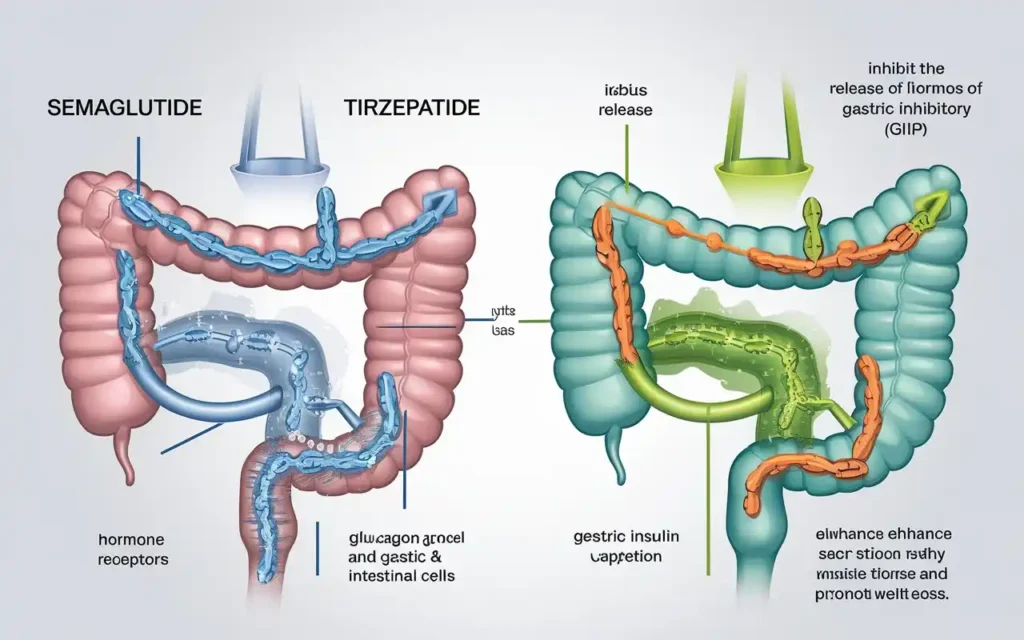
Understanding the semaglutide vs tirzepatide weight loss mechanisms is essential because it provides insight into how each drug influences appetite, metabolism, and overall energy balance.
2.1 Semaglutide
Semaglutide is a glucagon-like peptide-1 (GLP-1) receptor agonist. It works by mimicking the action of the natural hormone GLP-1, which increases insulin secretion, inhibits glucagon release, and slows gastric emptying. These effects collectively contribute to reduced appetite and increased satiety, leading to decreased caloric intake.
2.2 Tirzepatide
Tirzepatide is a dual glucose-dependent insulinotropic polypeptide (GIP) and GLP-1 receptor agonist. By targeting both GIP and GLP-1 receptors, tirzepatide enhances insulin secretion, suppresses glucagon, and slows gastric emptying more effectively. This dual action not only improves glycemic control but also significantly impacts weight loss by further reducing appetite and increasing feelings of fullness.
3. Efficacy in Weight Loss
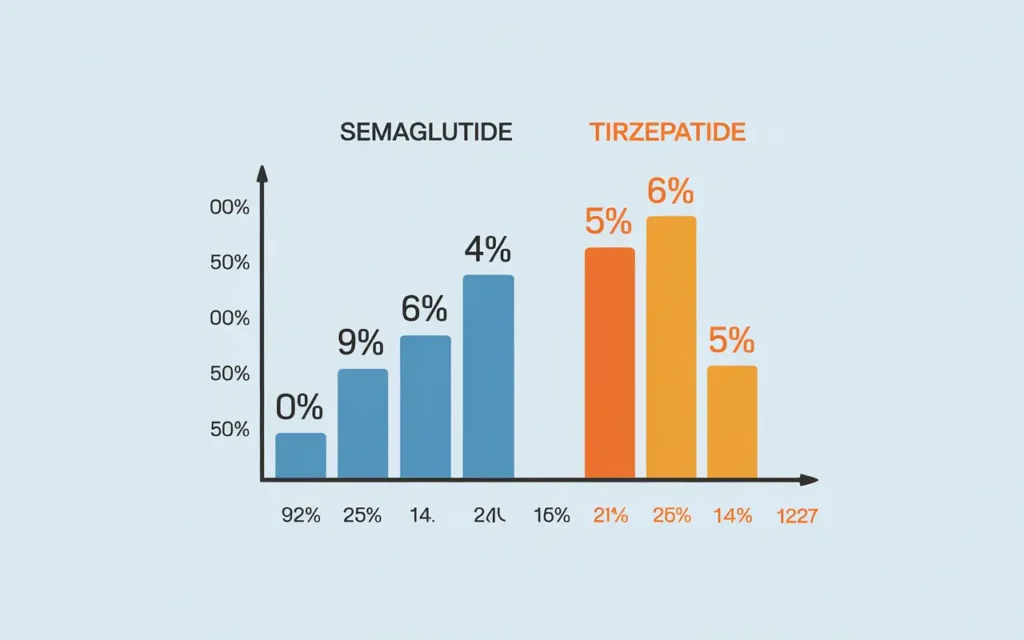
When comparing semaglutide vs tirzepatide weight loss, it’s crucial to evaluate the extent of weight reduction each medication offers based on clinical studies and real-world data.
3.1 Clinical Trial Results
Clinical trials have shown that both semaglutide and tirzepatide are effective in promoting weight loss, but tirzepatide often demonstrates superior results. For instance, in the SURPASS trials, tirzepatide led to greater weight loss compared to semaglutide, with some participants losing up to 20% of their body weight.
3.2 Real-World Effectiveness
In real-world settings, patients using tirzepatide have reported more substantial and sustained weight loss compared to those on semaglutide. The enhanced efficacy of tirzepatide is attributed to its dual receptor activity, which provides a more robust suppression of appetite and better metabolic regulation.
3.3 Comparative Analysis
| Medication | Average Weight Loss (%) | Clinical Trial Reference |
|---|---|---|
| Semaglutide | 15% | SUSTAIN Trials |
| Tirzepatide | 20% | SURPASS Trials |
4. Side Effects and Safety
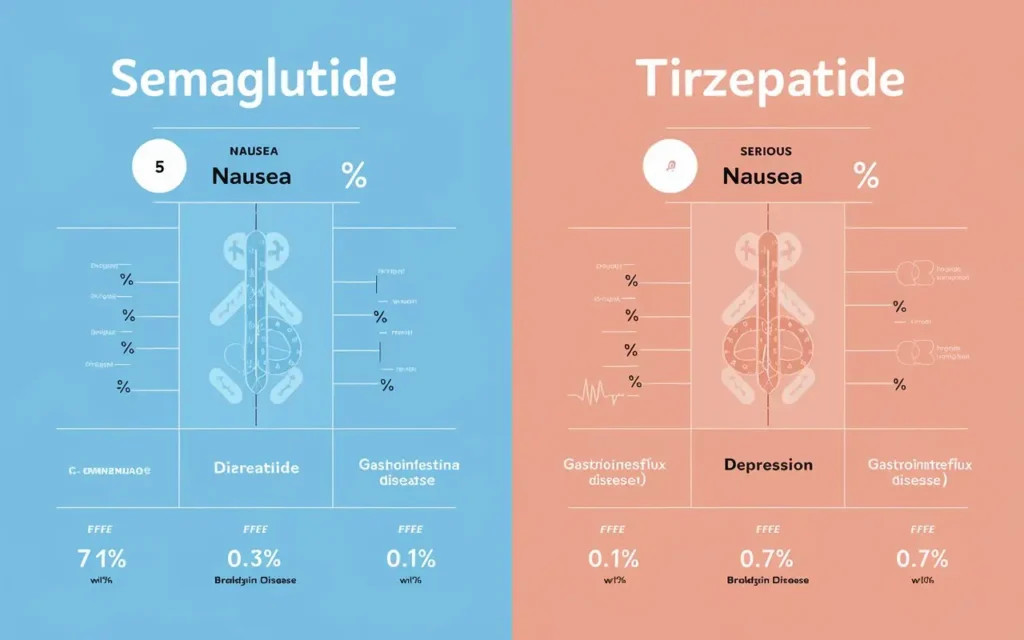
Evaluating the safety profiles is essential in semaglutide vs tirzepatide weight loss to ensure that the benefits outweigh the potential risks.
4.1 Common Side Effects
- Semaglutide: Nausea, vomiting, diarrhea, constipation, and abdominal pain.
- Tirzepatide: Similar to semaglutide, including nausea, decreased appetite, and gastrointestinal disturbances.
4.2 Serious Adverse Events
Both medications have been associated with rare but serious side effects such as pancreatitis, kidney injury, and potential thyroid C-cell tumors. It is crucial for patients to undergo thorough medical evaluations before starting these treatments.
4.3 Safety Comparisons
While both drugs share similar side effects, tirzepatide may have a slightly higher incidence of gastrointestinal issues due to its dual receptor agonism. However, the overall safety profiles are considered acceptable when monitored by healthcare professionals.
5. Cost Comparison
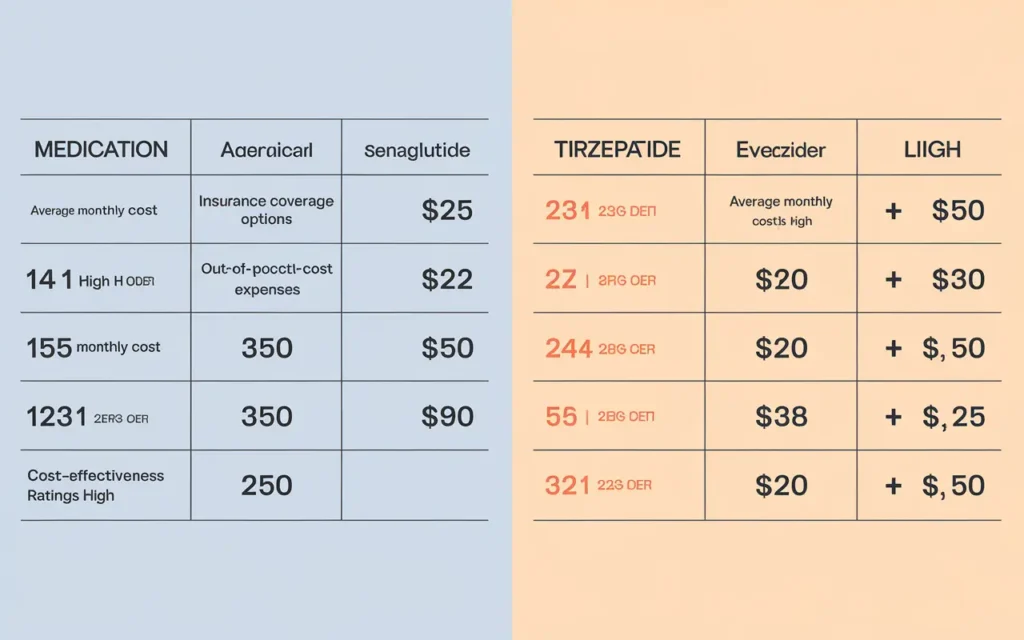
A significant factor in semaglutide vs tirzepatide weight loss decisions is the cost associated with each medication, including insurance coverage and out-of-pocket expenses.
5.1 Semaglutide Costs
Semaglutide is generally available as a generic option, making it more affordable for many patients. The average monthly cost ranges from $800 to $1,200, depending on insurance coverage and pharmacy pricing.
5.2 Tirzepatide Costs
Tirzepatide is a newer medication and is typically more expensive, with monthly costs ranging from $1,200 to $1,500. Insurance coverage may vary, and some patients might require financial assistance programs to afford tirzepatide.
5.3 Cost-Effectiveness Analysis
While tirzepatide is more expensive, its superior efficacy in weight loss may justify the higher cost for some patients, especially those who have not achieved desired results with semaglutide or other weight loss strategies.
6. Patient Experiences

Real-life testimonials provide valuable insights into the semaglutide vs tirzepatide weight loss journey, highlighting the practical aspects of using these medications.
6.1 Success Stories with Semaglutide
Many patients have reported significant weight loss and improved metabolic health while using semaglutide. Testimonials often highlight increased energy levels, better blood sugar control, and enhanced quality of life.
6.2 Success Stories with Tirzepatide
Patients on tirzepatide have shared experiences of rapid weight loss, reduced appetite, and sustained results over longer periods. The dual-action mechanism of tirzepatide is frequently praised for its effectiveness.
6.3 Comparative Testimonials
Some individuals have tried both medications and found tirzepatide to offer more substantial weight loss benefits, albeit with a slightly higher incidence of gastrointestinal side effects compared to semaglutide.
7. Clinical Trials Overview
A thorough examination of clinical trials is essential in understanding the semaglutide vs tirzepatide weight loss efficacy and safety profiles.
7.1 Semaglutide Clinical Trials
The SUSTAIN and STEP trials have provided extensive data on semaglutide’s effectiveness in weight loss. These studies demonstrated that semaglutide significantly reduces body weight and improves glycemic control in overweight and obese individuals.
7.2 Tirzepatide Clinical Trials
The SURPASS and SURMOUNT trials have showcased tirzepatide’s superior weight loss capabilities compared to semaglutide. Participants in these trials experienced greater reductions in body weight and improved metabolic markers.
7.3 Comparative Trial Results
| Trial | Medication | Weight Loss (%) |
|---|---|---|
| SUSTAIN | Semaglutide | 15% |
| SURPASS | Tirzepatide | 20% |
8. Diet and Exercise Integration
Incorporating diet and exercise is crucial in semaglutide vs tirzepatide weight loss strategies to enhance and sustain weight reduction outcomes.
8.1 Role of Diet
Both medications work best when combined with a balanced diet. Reducing caloric intake and focusing on nutrient-dense foods can amplify the weight loss effects of semaglutide and tirzepatide.
8.2 Exercise Regimens
Regular physical activity not only aids in weight loss but also improves cardiovascular health and metabolic function. Tailored exercise programs can help maximize the benefits of these medications.
8.3 Integrated Weight Management Plans
Developing a comprehensive weight management plan that includes medication, diet, and exercise can lead to more effective and sustainable weight loss. Healthcare providers often recommend such integrative approaches for optimal results.
9. Regulatory Approvals in the USA
Navigating the regulatory landscape is vital in semaglutide vs tirzepatide weight loss to ensure the use of these medications is compliant with FDA guidelines.
9.1 FDA Approval for Semaglutide
Semaglutide received FDA approval for chronic weight management in adults with obesity or overweight with at least one weight-related condition. The approval was based on substantial evidence from clinical trials demonstrating its efficacy and safety.
9.2 FDA Approval for Tirzepatide
Tirzepatide is approved by the FDA for the treatment of type 2 diabetes, with recent extensions considering its significant weight loss benefits. Ongoing studies are evaluating its approval specifically for weight management.
9.3 Regulatory Guidelines
Both medications must be prescribed by healthcare professionals who can monitor patients for efficacy and adverse effects. Adherence to FDA guidelines ensures safe and effective use of semaglutide and tirzepatide in weight loss therapies.
10. Long-Term Weight Maintenance
Sustaining weight loss is a critical aspect of semaglutide vs tirzepatide weight loss strategies, requiring ongoing commitment and support.
10.1 Challenges in Maintenance
Maintaining weight loss can be challenging due to metabolic adaptations and behavioral factors. Both semaglutide and tirzepatide can aid in long-term maintenance by controlling appetite and supporting metabolic health.
10.2 Strategies for Sustained Weight Loss
- Continued adherence to prescribed medication regimens.
- Regular monitoring and follow-ups with healthcare providers.
- Engagement in ongoing lifestyle modifications, including diet and exercise.
10.3 Role of Support Systems
Support from healthcare professionals, family, and support groups plays a vital role in long-term weight maintenance. Psychological support and counseling can also help address emotional and behavioral aspects of weight management.
11. Conclusion
The comparison of semaglutide vs tirzepatide weight loss reveals that both medications are effective tools in the fight against obesity. While semaglutide offers substantial weight loss benefits with a well-established safety profile, tirzepatide may provide even greater efficacy due to its dual receptor agonism. However, considerations such as cost, side effects, and individual patient needs play a crucial role in determining the most suitable option. Consulting with healthcare professionals is essential to make informed decisions tailored to each patient’s unique circumstances.
Ultimately, integrating these medications with lifestyle modifications can lead to more effective and sustainable weight loss outcomes, enhancing overall health and quality of life.

